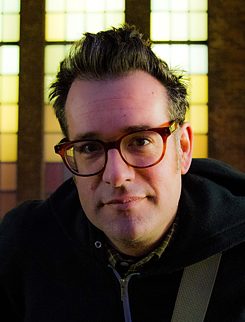Modern Work in Librarys
„We need to diversify“

When modern libraries are discussed, the staff is often envisioned as experts in digitization, integration, inclusion. „But it’s unfair to ask someone to learn everything“, says Nate Hill, Metropolitan New York Library Council.
By Samira Lazarovic
Mr. Hill, you are the Executive Director at the Metropolitan New York Library Council. What does a Library Council do?
The Metropolitan New York Library Council, aka METRO, is pretty unique. We are a membership organization for libraries, archives, museums, etc. in New York City and Westchester County. Our mission is to help library workers to be stronger, more efficient and innovative through collaboration. We do everything from operating a book delivery service to offering all different kind of trainings.
Can you give an example?
With funding from the Mayor’s Office of the Chief Technology Officer, we developed training on internet privacy and security that will be delivered to one library worker from every single library location in New York City. So hundreds of librarians will be trained. This means that when someone walks into a library feeling confused about something weird on her phone or whatever, they will be able to receive a little bit of guidance.
We also have a studio facility for those interested in learning about digitization and migrating media out of obsolete formats. Our facility features audio and podcasting equipment, as well as a lot of funky vintage magnetic tape decks. We also do some metadata work and software development. For example, the New-York Historical Society contracted with us to build a repository system for their digital library assets.
Our audience are the library workers. We have to develop services that are very targeted for their unique needs. Honestly, these programs are often difficult to correctly tailor and then implement across multiple organizations since all librarians work differently.
How do you organize these programmes?
Like a public library with a network of partners. We have 14 people working here, and though they are brilliant, it would be impossible to have all the expertise we need on staff. So we work with our own member-network to identify the experts. When you have Columbia University and the MoMA Library as members, they are going to have such incredible expertise, we need to use that.
What skills would I need to do the job of a modern librarian?
It’s challenging because the services that people already identify with libraries are not going away. People still come to the library to get books and advice. So we have to do all of that plus all of these great new roles. But you cannot expect a library worker to keep on just adding more and more or to know to do everything at once. I really think we need to have more different kinds of librarians to serve our audiences. Does that make sense?
A library worker should be the type of character who is happy to take on new challenges.
It is, right? I think one of the best core things a librarian can have is curiosity, their own desire for lifelong learning. At the same time it’s unfair to ask someone to learn absolutely everything. So ideally a library worker should be the type of character who is happy to take on new challenges and try new things.
Nevertheless there are a lot of new techniques out there: AI, Augmented Reality, Robotics. What kind of technology will be important for Libraries?
Libraries play such an important role in public and social infrastructure, that there is no technology or component of modern life that isn’t part of it in one way or the other. A good library is a reflection of its community and the world at that time.
But still: What is in your eyes the „next big thing“ for public libraries?
In the past ten years of my career people were asking that questions about the next disruptive technology coming on. Questions like: What are we gonna do? How we are going to stay relevant? Are there going to be books? What’s up with Google? What about Artificial Intelligence?
One thing that makes me really happy about the current state of the profession – and unfortunately it may be the result of more difficult times in the world – is, that in the last couple of years I see people getting beyond these kinds of questions. Now, as a profession, I believe we are thinking more constructively about how to address issues like information equity, equal research opportunities for everyone, and so on. People are much less interested in having that gimmicky features-libraries-conversation about that next-big-thing-kind of gadget. So I’m kind of dodging your question, but I’m also really kind of proud that I get to!
 Nate Hill
| Photo (detail): private
Nate Hill
Nate Hill
| Photo (detail): private
Nate HillNate Hill is the Executive Director at the Metropolitan New York Library Council. Before joining METRO in June 2015, Nate served as Deputy Director of the Chattanooga Public Library. Nate was named a „Mover and Shaker“ by the Library Journal in 2012. Since childhood libraries were under his most favorite places in the world.
Comments
Comment